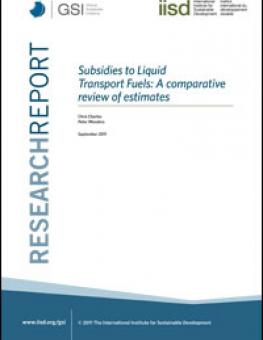
Subsidies to Liquid Transport Fuels: A comparative review of estimates
This review highlights the paucity of consistent information and data on subsidies to biofuels and conventional transport fuels. It also highlights the limitations of global estimates for subsidies, concluding that robust national estimates are necessary to proceed with further evaluation of subsidies.
The extent to which governments subsidize biofuels and conventional transport fuels is not generally clear. The use of biofuels, such as ethanol and biodiesel, is seen as a renewable substitute for fossil-based fuels such as petrol and diesel. While the literature on energy subsidies is considerable and growing, only a few organizations attempt to quantify the level of these subsidies. This paper reviews the information currently available for each fuel type, the main methods used to quantify subsidies, identifies the major gaps in the literature and makes a preliminary comparison of results.
You might also be interested in
The Cost of Fossil Fuel Reliance
Government support for fossil fuels reached at least USD 1.5 trillion in 2023, new data shows.
Increased Support Needed to Achieve India's Clean Energy Goals
India is on track to achieve many of its 2030 clean energy goals but needs to step up government support measures to accelerate the deployment of offshore wind, electric vehicles, and green hydrogen, according to a new report.
Ending Export Credits for Oil and Gas: How OECD countries can end 2024 with a climate win
For a year now, Organisation of Petroleum Exporting Countries (OECD) governments have been negotiating an agreement that could put an end to oil and gas export finance. Following the acrimony in Baku, this would be a very real way for the OECD to show policy coherence, respond to calls from the poorest countries to stop subsidizing fossil fuels, and shift public finance to solutions.
Fossil Fuel Production, Renewable Energy, and Subsidy Reform in Nationally Determined Contributions 3.0
This policy brief provides an analysis of the critical benchmarks and recommendations necessary for aligning nationally determined contributions (NDCs) with the 1.5 °C target.